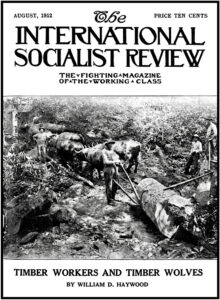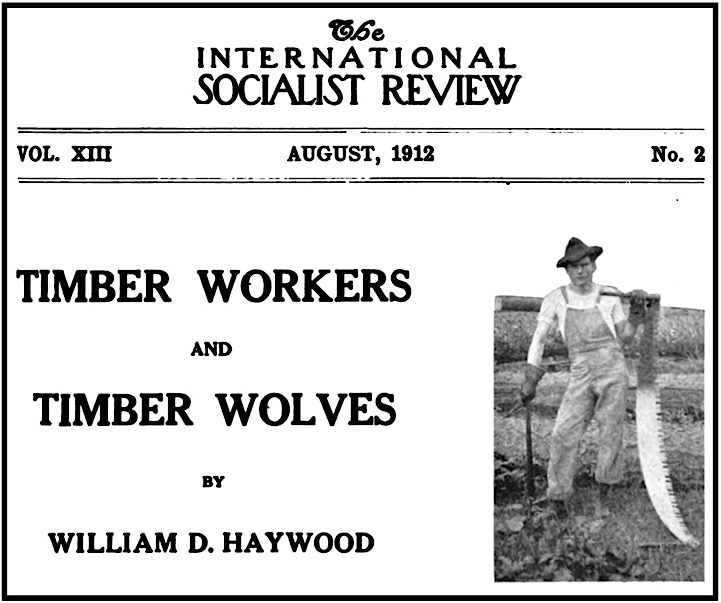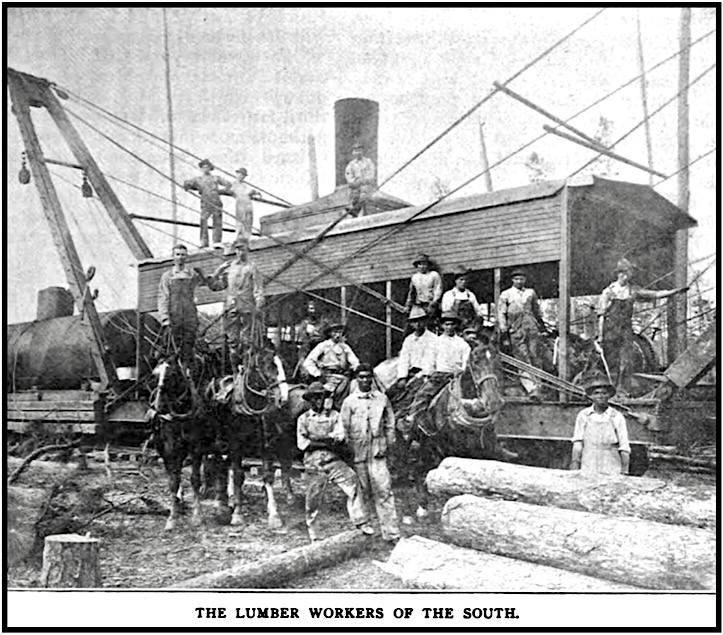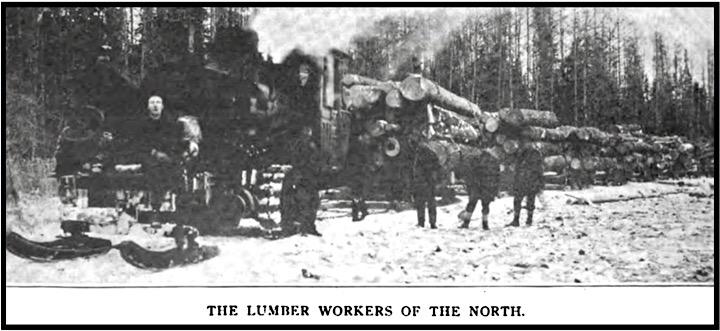 —————
—————
Hellraisers Journal – Saturday August 3, 1912
Brotherhood of Timber Workers Organizing Campaign in Louisiana
From the International Socialist Review of August 1912:
[Part II of II]
Before the campaign of organization [Brotherhood of Timber Worker] now inaugurated by the Industrial Workers of the World is closed the lumber barons of Dixieland will have learned that it is impossible to fell trees with rifles and saw lumber with six shooters.
It should be mentioned here that of the nine men arrested four are non-union men, two of them, John and Paul Galloway, being owners of the Lumber Company. All are charged with murder. This, perhaps, indicates that the Trust has not entirely corralled the officialdom of Louisiana. It is certain that they are in bad repute with the business element in nearly all of the towns as their commissaries have been the means of controlling nearly the entire earnings of their employees, who are compelled to trade with the companies or lose the only means they have of making a living.
To maintain their absolute control of the camps the lumber companies, with the aid of their thugs, patrolled the towns, in some places inclosures were built around the mills and shacks. Notices were posted warning away union men, peddlers and Socialists.
Only a few days ago, H. G. Creel, one of the Rip-Saw editors on a lecture tour, was roughly handled at Oakdale and DeRidder, La. He was compelled to leave the first-named place, being threatened and intimidated by gun-men.
The small merchant realizes that if the workers are allowed to trade where they choose some of their money would pass over their counters and they know if wages are increased there would be a corresponding increase in their day’s receipts. This will account for the fact that the small business man and farmer have given their sympathy and a measure of support to the growing union of timber workers.
Arthur L. Emerson and Jay Smith, both Southern born, are the men around whom interest centers. They are the men who organized the Brotherhood of Timber Workers. Emerson had made two trips to the West-one to the Lumber District to the Southwest and the other to the Northwest. It was during the time that he worked with the lumber jacks of the Pacific Coast that he learned the need of organization. This thought was especially developed when he came in contact with the Lumber Workers’ Union of St. Regis and other points in the Bitter Root Range of Mountains. Being a practical lumber jack and saw mill hand and mill-wright himself, he saw at once the discrepancy in wages between the Pacific Coast and the Gulf States and upon his return to Dixieland he immediately took up the burden of organizing the workers as the only possible means of bringing up their wages and conditions to the level of the already too-low Western scale.
His first attempt was at Fullerton, Louisiana, where, after securing employment in the mill, by energetic work, he had in a few days secured a list of eighty-five of the one hundred and twenty-five employes who signified their willingness to join an organization such as he, in his earnestness, explained to them, outlining the benefits to be derived if all would stand together in one union.
Emerson traveled from place to place securing a few days’ employment in the different lumber camps, carrying his message of unionism to the slaves of the pine forests and cypress swamps of the Southern states.
In this work of organization, he soon enlisted Jay Smith, his colleague in office, the present Secretary of the organization, and thousands of other stalwart men of the woods and saw mills, never hesitating at the color line or the nature of a man’s work.
The framework of the Brotherhood of Timber Workers was as solid as the heart of the mighty oak that they converted into lumber. It was securely rooted. With headquarters at Alexandria, La., it branched out into the surrounding states. Its membership rapidly increased until thirty thousand of the wage slaves of the Lumber Trust were enrolled in its ranks.
Through the system of espionage which the Trust has established through-out its domain, the managers of the companies kept themselves informed of the work of the organization and its rapid growth. They realized that with this kind of an organization to contend with, their despotic methods would be at an end and they determined to destroy it root and branch.
To this end the Southern Lumber Operators’ Ass’n. applied the most drastic action, closing down without notice forty-six mills. The thousands of workers who were employed in the lumber industry were thus deprived of their means of livelihood and left to shift for themselves. This arbitrary shut-down was continued for a period of nearly six months and it is only now that the operators are endeavoring to run their mills as the demand for lumber has become so great and as the prices are higher than at any period in the history of the lumber industry the most vigorous efforts are being made to man the mills with non-union labor.
Being unsuccessful a few of the largest companies have withdrawn from the Association; have granted the demands of the Timber Workers and are now running their mills night and day to fill their accumulated orders.
The more obstreperous members of the Association are still trying to maintain their black list through the agency of their labor clearing house which has recently been established Branch Headquarters located at Alexandria.
Their black-listing system is the most complete in operation anywhere. A man is compelled to give his name, birth place, his color is recorded, the name and residence of his relatives, his former place of employment, the reason of his discharge or leaving his last place of work and particularly is he compelled to abjure all connection with the Brotherhood of Timber Workers or the Industrial Workers of the World. No later than the Fourth of July, celebrated as Independence Day in this country, John Henry Kirby, one of the wealthiest timber barons of the South, in a spread eagle oration, declared:
“That we do ask a man when he applies to us for work whether he is a member of the B. T. W. or I. W. W. If he is, we have nothing that he can do.”
Thus a free-born American citizen, or one who has adopted this “Freeland” as his country, is denied the right to live and at the same time belong to this organization. The two having now merged, Mr. Kirby will have to refer to them as one in the future.
At the last convention of the Brotherhood of Timber Workers, attended by the writer, which was held last May, by an almost unanimous vote, application was made to the Industrial Workers of the World for a charter. The action oi the convention was submitted to a referendum of the rank and file and has been sustained without a single opposing vote.
In September the Timber Workers of the South will meet in Convention representatives of timber workers from all other districts.
This meeting will be held in Chicago at about the time of the general convention of the Industrial Workers of the World. Then a National Industrial Union of Timber and Lumber Workers will be formed. This will include all of the workers employed in the United States, Canada and Mexico, in this industry, which in this country, is the third largest in importance and employs, perhaps, more men than any other.
Until the American Labor Union, which later merged with the I. W. W., began organizing the Lumber Workers, these millions of men were without a union of any kind. The organization which has now such a splendid foothold, will not limit its jurisdiction to any craft, section or division of the industry, but will include every man employed in the woods, the mills and the en-related industries.
The fight will be a long one and a bitter one. The struggle will be intense. Members and their families will suffer keen heart pangs, as the lumber barons will not loosen the stranglehold on their ill-gotten profits until they have exhausted every weapon that Capitalism has armed them with. But now that the workers of the Southland have joined hands with their fellow workers of the North, there can be but one result as the outcome of their united efforts. It can be recorded in one word-VICTORY! And the first step has been taken in the onward march toward Industrial Freedom.
[Emphasis added.]
~~~~~~~~~~~~~~~~~~~~~~~~~

SOURCE & IMAGES
International Socialist Review
(Chicago, Illinois)
-Aug 1912, pages 105-10
https://www.marxists.org/history/usa/pubs/isr/v13n02-aug-1912-ISR-gog-ocr.pdf
See also:
Tag: Brotherhood of Timber Workers
https://weneverforget.org/tag/brotherhood-of-timber-workers/
“The Brotherhood of Timber Workers 1910-1913:
A radical response to industrial capitalism
in the southern USA” by James Green, 1973
https://files.libcom.org/files/650194.pdf
~~~~~~~~~~~~~~~~~~~~~~~~~
Timberbeast Lament – Utah Phillips



